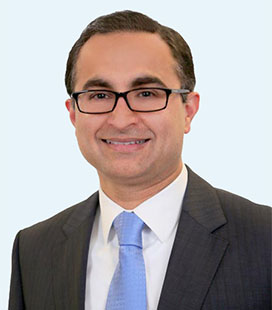
Asad Cheema, MD, is medical director of the Cardiac Electrophysiology Laboratories at Englewood Health
What is the most common heart rhythm disorder?
Dr. Cheema: Atrial fibrillation (AFib) is the most common heart rhythm disorder in the United States, affecting close to 10 percent of people over 65, according to the Centers for Disease Control. Other common disorders are atrial flutter, tachycardia (fast beats), bradycardia (slow beats) and premature ventricular contractions.What is a cardiac electrophysiologist?
Dr. Cheema: Cardiac electrophysiologists are specialists in heart rhythm disorders. As “electricians” of the heart, we specialize in the complex electrical system that controls the heartbeat and pumping of the heart.What is your approach to treating patients?
Dr. Cheema: My philosophy has always been to lay out all the options for patients and let them ask all the questions they need to, so they can make an informed decision.Are there new technologies to treat atrial fibrillation?
Dr. Cheema: Yes. Procedures that used to take eight to 10 hours now take an hour to an hour and a half. For example, catheter ablation (a minimally invasive procedure that uses either radiofrequency energy or very low temperatures to “ablate,” or destroy, the problematic electrical pathway) is now done on an outpatient basis. 3D mapping for ablation procedures now enables us to pinpoint the exaction location of the arrhythmia. This reduces the time the procedure takes, avoiding excess radiation exposure and increasing patient safety. The Heart and Vascular Institute at Englewood Health now offers the FDA-approved Watchman™ left atrial appendage (LAA) closure device. Closing off the LAA (a small pouch off the left atrium) can greatly reduce the risk of stroke from atrial fibrillation. For many patients, it is considered safer than blood thinners.Any words of wisdom for people with AFib?
Dr. Cheema: With atrial fibrillation, you used to just have to live with it. Now there are ways to fix it. You don’t have to compromise on quality of life. There are options for treating your heart rhythm disorder with excellent results. Posted February 2019
Asad Cheema, MD, is medical director of the Cardiac Electrophysiology Laboratories at Englewood Health
